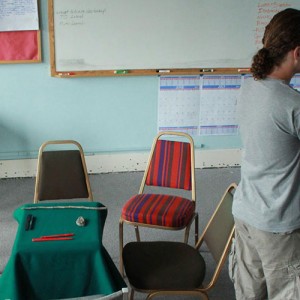WAYK Episode 7: Technique “Money Talks”. 58 minutes and 28 seconds.
It’s tempting to dismiss the more mundane reasons for using, learning, and teaching language, but at the heart of language acquisition, you’ll find the hunger to grow up, to get the necessities of life, and start a family.
[UPDATE: Here’s a link to an excellent article on what happens when you just go ahead and start a regular conversation gathering. “Talk. Just talk.” A small informal Osage conversation group turned into an entire model language program, with full time paid staff and a healthy budget. The author notes: “In case anyone forgot language is a sovereignty qualifier. Meaning, in order to get, and theoretically maintain, your legal status as a tribal sovereign nation you must have a separate and distinct language and culture. Without this component all of the legal framework for which the Casinos and other business ventures (that fund EVERYTHING) sit on means [nothing]”.]
In this conversation between Evan and Willem, you’ll hear them address the following issues:
– Technique “Money Talks“
- Acquiring the technical command of teaching and learning.
- Evan talks about the history of native language education in Oregon; how do you get a teaching certificate in your native (indigenous and academically unrecognized) language?
- The history of Oregon Senate Bill 690, 2001. Establishing emergency teaching licenses for fluent elders, in teaching their own language.
- The problems with getting a university major in most native languages (Evan uses the example of Klamath).
- Evan sends out appreciation for the work of the following people and institutions: Dan Morris (Chair of Foreign Languages at Southern Oregon University), Sandra Freels (Dept. Chair Foreign Language and Literatures at Portland State University), Eastern Oregon University (for providing a model distance learning system for students studying their language in their home community), Lane Community College (for establishing a course of study in the Chinuk Wawa language).
- Willem and Evan speak about other ways “money talks“; knowing your language with the WAYK game can help you earn a living outside of public institutions.
- Evan sketches one possible WAYK strategy for employing young instructors and kick-starting community language revitalization.
- Evan says: “Pay your teenagers for playing games!”. He and Willem talk about the ways in which this isn’t a “cash reward for play”, but a demonstration of the utility and value of native language acquisition. Often learning your native language seems to have no perceived economic impact.
- Evan remarks on the subversive joy of watching a 12 year old WAYK instructor teach visiting college-age students (studying in the Applied Linguistics program at PSU) the Chinuk Wawa language using WAYK. The students rarely seem to know what hit them. Very cool, and a self-esteem builder to boot, for the young instructor.
- Justin, a Chinook Nation Chinuk Wawa instructor, is 16 years old, and has been teaching for 3 years. He is currently a WAYK teacher-trainer, and innovates new techniques all the time. Compare his years of experience-based technical skills in applied linguistics to a recent graduate of a college linguistics program.
- the Economic factor driving language extinction.
- Evan tells the story of his sister and her sign language skills.
- Speed of language acquisition, in WAYK, is based first and foremost on the ability to do complex transactions (“want/have/give/take“) in the target language. This has a clear economic impact (“I want to sell you three matryoshka dolls”).
- Willem tells the possible future story of a Chulym granddaughter in a Siberian village, inspired by the movie “the Linguists”.
- Language learning and teaching is a biological act.
- No one commercial language is at fault for language extinction. Chinuk Wawa replaced many tribal languages spoken at Grande Ronde, as English later replaced it too.
- Playing WAYK means changing our relationship to language acquisition.
- “Money Talks” means appreciating the needs of teenagers to individuate and acquire the life skills to start a family someday.
- the necessities of Life and the most fundamental human values drive language acquisition.





